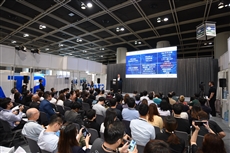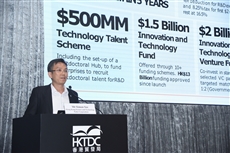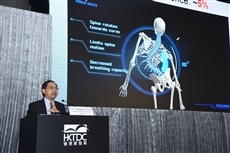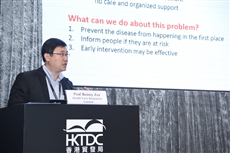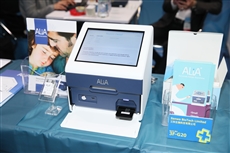Local biotech start-ups begin to target mass market
17 May 2019 – Hong Kong is known around the world for its financial might, iconic skyline and international outlook. But it might not be long before the city is known for something totally outside its traditional realm: cutting-edge healthcare solutions. This was the focus of a seminar titled “Biomedical Technologies that are Changing Healthcare”, which took place on 14 May at the Hong Kong Convention and Exhibition Centre (HKCEC) as part of the HKTDC Hong Kong International Medical and Healthcare Fair.
The Hong Kong Special Administrative Region (HKSAR) Government has made a concerted push to promote innovation and technology (I&T), putting significant investments into initiatives that strengthen the city’s I&T sectors, with a view to creating a world-class innovation hub. The Hong Kong Science and Technology Parks Corporation (HKSTP) has been one of the key channels for I&T-focused investment. According to Simon Sze, Associate Director, Biomedical Technology Cluster at the HKSTP, since its establishment in 2001, HKSTP has become home to more than 120 biotech companies, working closely with local universities to research, develop and commercialise smart solutions that address serious health conditions.
Three of the best and brightest biotech companies to emerge from HKSTP were featured at the seminar, each of them helping to change lives in the most incredible ways.
Eye examinations for early detection of dementia
People are living longer worldwide, but this is likely leading to increased rates of age-related neurological issues, like stroke and dementia. Benny Zee Chung-ying, Head of Biostatistics at the Chinese University of Hong Kong (CUHK) and his team developed a technology that detects white matter hyperintensities, or WMH, through the retina of an eye. By detecting an increase of white matter in an otherwise normal brain, an Automatic Retinal Image Analysis (ARIA) can predict with high accuracy and specificity whether someone is at high risk of developing Alzheimer’s or dementia.
Early detection for WMH is key, as lifestyle changes have been proven to be effective in reducing the amount of white matter in a brain, according to Prof Zee, who founded biomedical start-up Healthview Bioanalytic at HKSTP. The company’s detection technology is now used in a number of optical chains and health clinics around Hong Kong.
Saving scoliosis sufferers from cancer
Scoliosis is a condition that results in the spine twisting out of alignment, causing limited spine motion and decreased breathing capacity. Globally, scoliosis has a prevalence of 5%, but some regions and populations are hit harder than others. “In Guangzhou, they found that around 14% of girls aged between 13-14 had scoliosis,” said Yongping Zheng, Technical Advisor at Telefield Medical Imaging Limited, explaining the need for improved scoliosis scans.
Prof Zheng outlined the current methods used to detect and monitor scoliosis in patients, all of which have serious drawbacks for patients. For example, X-ray imaging carries serious implications for anyone suffering a lifetime of scoliosis; one study in Denmark linked childhood exposure to X-ray imaging to a fivefold increase in cancer later in life, according to Prof Zheng.
This is partly why he helped to develop Scolioscan, a radiation-free scan for deformed spines. Not only is it safer for long-term use and the monitoring of sufferers, the device is also portable, making it easier for the technology to reach rural populations. Scolioscan now has 23 patent families and has been approved for use in markets like the European Union and Australia.
Slashing test times for potentially critical illnesses
Point-of-care testing (POCT) is a medical diagnostic test done when a patient comes in to receive treatment. It’s a vital part of patient care, as accurate identification of the underlying illness defines the necessary steps to proper treatment, and in some cases preventing further infection. Kelvin Chiu, however, saw flaws in the time-intensive, low-accuracy processes currently involved in POCT. “It’s a known problem − we have an overload problem in the public system,” said Mr Chiu, CEO of Sanwa Biotech Limited. “What we’re trying to do is revolutionise this testing paradigm.”
His company developed the Array Based LED-induced Fluorescence ImmunoAssay platform, or ALiA, a rapid and portable diagnostic platform capable of slashing the time it takes to diagnose potentially critical illnesses, without sacrificing accuracy. By giving doctors on the frontline access to laboratory-grade tools like these, Mr Chiu believed the potential results could be far-reaching, detailing one area where ALiA could have a huge impact. “In the world, roughly more than half a million people have passed away because of this [the flu] last year.”
Through the use of a single, tiny biochip that is capable of handling extremely small volumes of fluid, the device tests for a variety of diseases using a biomarker array. Testing time is reduced to just 15 minutes, a massive reduction from the standard 24-48 hours it currently takes to receive results in the Hong Kong public healthcare system. Mr Chiu said the system could also be used for ex-clinical applications, offering customised solutions in areas like food safety and pharmaceutical research and development.
Sanwa Biotech devices will soon be used widely in local hospitals, following two years of clearing the necessary hurdles to market in Hong Kong. Still, it was a process this promising biotech start-up was willing to undertake in order to serve the local community and, with the support of HKSTP, it achieved its goals of reaching the masses.
Fair website
Hong Kong International Medical and Healthcare Fair: http://www.hktdc.com/hkmedicalfair/
|
|
The “Biomedical Technologies that are Changing Healthcare” seminar was held as part of the 10th HKTDC Hong Kong International Medical and Healthcare Fair, organised by the Hong Kong Trade Development Council (HKTDC) |
|
|
Simon Sze, Associate Director, Biomedical Technology Cluster with the Hong Kong Science and Technology Parks Corporation (HKSTP) said that various resources to support the commercialisation of biomedical technology have been introduced in Hong Kong |
|
|
Yongping Zheng, Technical Advisor at Telefield Medical Imaging Limited, introduced the company’s product Scolioscan – a radiation-free portable scan to detect and monitor scoliosis |
|
|
Benny Zee Chung-ying, Head of Biostatistics at the Chinese University of Hong Kong (CUHK), said his team developed an Automatic Retinal Image Analysis (ARIA) that can predict with high accuracy and specificity whether someone is at high risk of developing Alzheimer’s or dementia |
|
|
ALiA, a rapid and portable diagnostic platform developed by HKSTP-based start-up Sanwa Biotech Limited, shortens the time for diagnosing potentially critical illnesses to 15 minutes |
Media Enquiries
Please contact the HKTDC’s Communication and Public Affairs Department:
Natalie Wong Tel: (852) 2584 4472 Email: natalie.hy.wong@hktdc.org
Ivion Xie Tel: (852) 2584 4395 Email: ivion.y.xie@hktdc.org
About the HKTDC
The Hong Kong Trade Development Council (HKTDC) is a statutory body established in 1966 to promote, assist and develop Hong Kong’s trade. With 50 offices globally, including 13 in Mainland China, the HKTDC promotes Hong Kong as a two-way global investment and business hub. The HKTDC organises international exhibitions, conferences and business missions to create business opportunities for companies, particularly SMEs, in the mainland and international markets. The HKTDC also provides up-to-date market insights and product information via trade publications, research reports and digital news channels. For more information, please visit: www.hktdc.com/aboutus.


